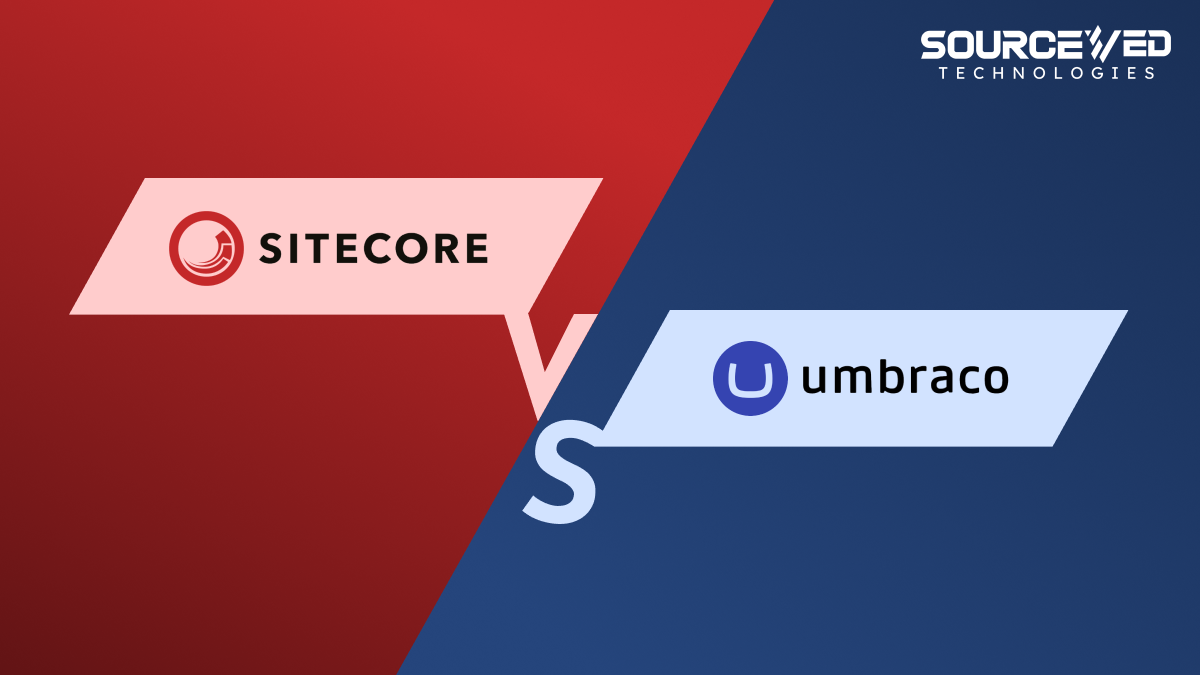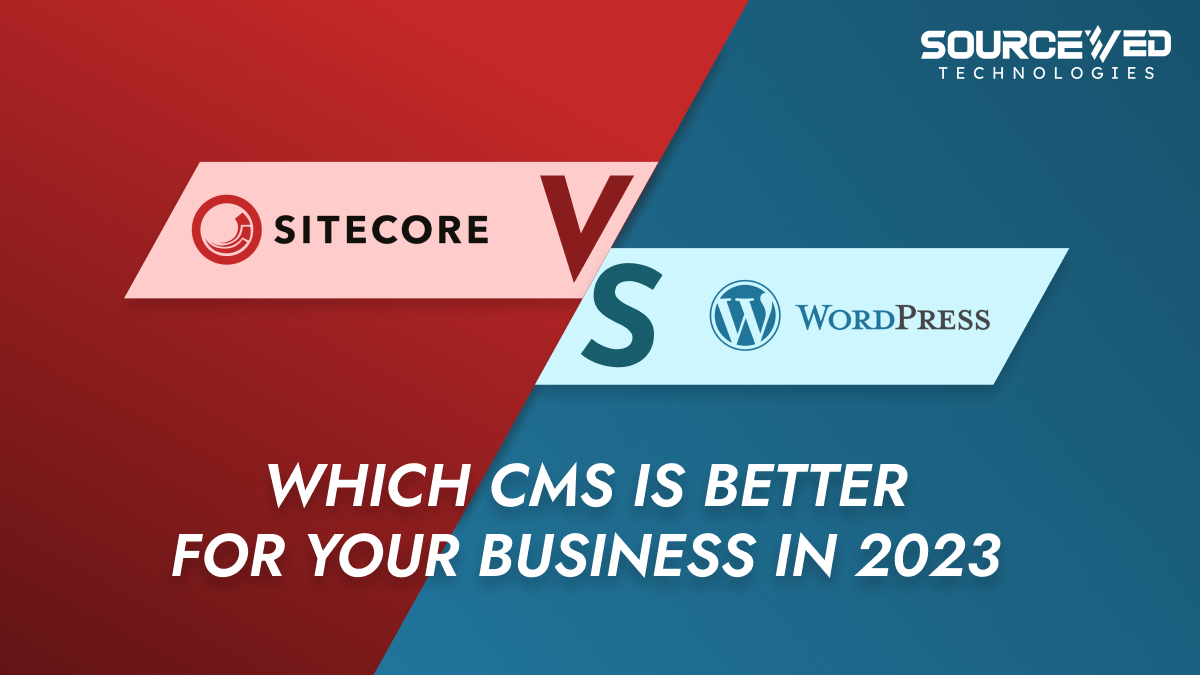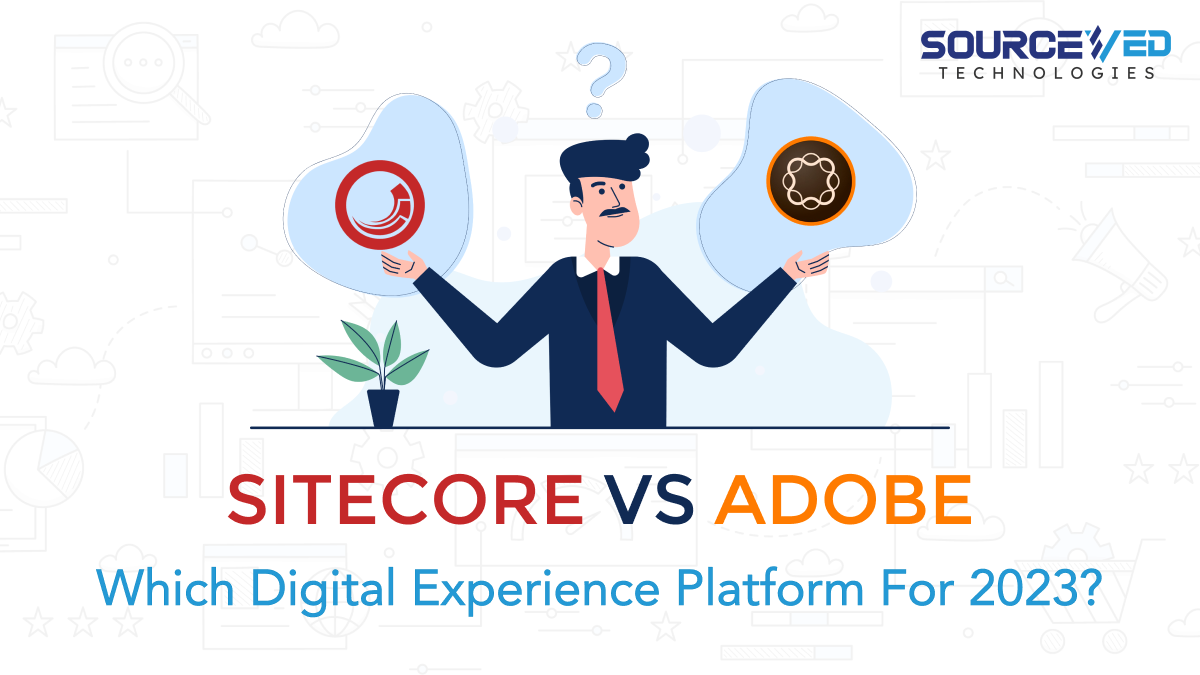Sitecore and Umbraco are widely used content management systems (CMS) that are among the most popular on the market today. Companies and organizations extensively use both platforms to maintain their online presence, and both provide a variety of features and functionalities that make them suited for a wide variety of websites. Businesses and organizations utilize both platforms to manage their online presence.
Sitecore is a content management system (CMS) developed for large-scale websites and digital experiences requiring high complexity. It is a completely integrated platform with various capabilities, such as content management, customization, analytics, and marketing automation. Sitecore is well-known for its adaptability and scalability, qualities that make it an excellent option for companies with a significant online presence and extensive requirements for content management.
On the other hand, Umbraco is an open-source content management system (CMS) created to be adaptable, user-friendly, and simple to customize. Due to the fact that it is constructed on the Microsoft.NET foundation, it is a well-liked option among firms and developers already accustomed to Microsoft’s many technological offerings. Umbraco is a content management system (CMS) well-known for its simplicity and ease of use. As a result, it is an excellent option for less extensive websites and organizations that do not want the whole set of functionalities that Sitecore provides.
Why Compare Sitecore and Umbraco
The price structures of Sitecore and Umbraco are two primary areas in which they diverge from one another. Umbraco is an open-source program that is completely free to use, unlike Sitecore, which is commercial software that requires users to pay a license fee.
The price plan for Sitecore might be costly, particularly for companies of a smaller size, but it comes with various features and support choices that make it a reasonable investment for bigger organizations. Because it is free, Umbraco is a viable alternative for smaller companies and organizations with restricted financial resources.
The user interfaces of Sitecore and Umbraco are another significant area in which these two platforms vary. Because the user interface of Sitecore is more involved and fuller of features than that of Umbraco, it is a better option for companies with sophisticated content management system requirements. Since the user interface of Umbraco is more straightforward and less complicated, this content management system is an excellent option for less complex websites and organizations that only need part of the set of functionalities that Sitecore provides.
In this blog, we will compare Sitecore vs Umbraco to make you decide which platform is better for your business.
About Sitecore
Sitecore is a robust content management system (CMS) that was developed to serve the needs of companies. It provides a wide variety of features and functionalities that assist organizations in creating, managing, and optimizing their online content, improving consumer engagement, and driving conversions. The following is a list of some of the most important features that the Sitecore CMS offers to businesses:
Content Management:
Sitecore CMS is a content management system that makes it simple for organizations to generate, manage, and publish new material. It offers a user-friendly interface that eliminates the need for technical skills and enables content producers to develop and distribute the material without restriction. In addition, using Sitecore CMS makes it possible for organizations to improve the efficiency with which they manage their content by providing capabilities such as version control, processes for content approval, and content reuse.
Customization:
The Sitecore CMS has powerful customization tools that make it possible for companies to provide personalized content to the consumers of those enterprises. Sitecore CMS can provide personalized content suggestions and offers by analyzing user data and behavior. This has the effect of increasing customer engagement as well as customer loyalty.
Marketing Automation:
The Sitecore CMS has a comprehensive set of marketing automation tools that enable organizations to automate their marketing campaigns and increase the rate at which customers convert to customers. Sitecore CMS is capable of helping organizations enhance their return on investment (ROI) and generate more conversions thanks to capabilities such as automated email sending, A/B testing, and lead scoring.
Analytics:
The Sitecore CMS comes equipped with a number of powerful analytics features that make it possible for organizations to monitor and evaluate the actions of their users. Businesses can obtain vital insights into the behavior of their customers and optimize their content and marketing tactics by these newfound understandings using capabilities such as site analytics, engagement analytics, and campaign analytics.
Scalability:
The Sitecore Content Management System is a highly scalable platform that can manage effective content and traffic. It offers support for several languages, administration of multiple sites, and hosting choices that are based in the cloud so that it can expand along with your company as it does.
Sitecore Content Management System is a robust platform that provides various features and capabilities that may assist organizations in developing, managing, and optimizing their online content. Sitecore CMS is a great option for companies who want to boost their online presence and increase the conversions they get due to their online presence because of its superior personalization, marketing automation, analytics, and scalability capabilities.
About Umbraco
Umbraco is a well-known open-source content management system (CMS) appropriate for organizations of any size. It provides various features and functionalities that assist organizations in creating, managing, and optimizing their online content.
Additionally, it can help boost consumer engagement and generate conversions. The following is a list of some of the most important advantages that Umbraco CMS offers to companies:
The Umbraco Content Management System has great flexibility and is very adaptable. This enables companies to develop a one-of-a-kind online presence that accurately represents their brand and business objectives. Umbraco CMS can assist organizations in developing a website that satisfies their particular demands and specifications since it offers a diverse collection of templates, plugins, and personalization choices.
User-Friendly Interface:
The user-friendly interface that Umbraco CMS provides makes it simple for companies to produce and manage their content. Material producers may rapidly develop new material and distribute it using an interface that allows them to drag and drop elements, eliminating the need for them to have any prior technical knowledge.
Integration:
The Umbraco CMS interfaces without any problems with various third-party tools and platforms, making it simple for companies to add new website features and functionality. Businesses can link their websites to other company systems and procedures using connectors for popular technologies such as Google Analytics, MailChimp, and Salesforce.
Security:
The Umbraco CMS comes equipped with comprehensive security measures that companies can use better to guard their websites and customers’ data. Umbraco CMS gives companies the ability to protect both their websites and their data from malicious cyber activity by providing capabilities such as user roles and permissions, support for a
secure socket layer (SSL), and secure authentication methods.
Cost-Effective:
Because it is open-source and free to use, Umbraco Content Management System (CMS) is a cost-effective alternative for organizations. Because of this, it is an excellent option for companies of any size searching for a content management system (CMS) that provides a variety of features and capabilities without the exorbitant fees often associated with proprietary CMS systems.
Umbraco CMS is a perfect platform for organizations of any size because of its flexibility, user-friendliness, and cost-effectiveness. Umbraco CMS is an excellent option for companies trying to develop and manage their online content simply and efficiently because of its highly flexible design, user-friendly interface, integration possibilities, security features, and cost-effectiveness. Umbraco CMS is also a wonderful alternative for organizations looking to integrate security elements into their website.
Sitecore vs. Umbraco: A comparison
Two of the most well-known CMSs are now available are Sitecore and Umbraco. Both systems are loaded with tools that may boost a company’s chances of success in online content development, management, and optimization, as well as in consumer interaction and monetary gain. Organizations need to compare Sitecore and Umbraco, two popular content management systems.
1. Content Management
When it comes to managing content, both Sitecore and Umbraco are powerful options, although Sitecore offers more sophisticated tools. Sitecore’s version control, content approval procedures, and content reuse capabilities help organizations better manage their content and keep it up-to-date. However, Umbraco’s intuitive interface simplifies enterprises’ content creation and management processes.
2. Customization
Using the Sitecore content management system (CMS), websites can tailor their offerings to individual visitors using sophisticated customization capabilities. Improve customer engagement and loyalty with Sitecore’s tailored content suggestions and promotions. On the other hand, Umbraco only offers rudimentary personalization options like page targeting and device/location-based customization.
3. Automation of marketing
Automated marketing campaigns and improved conversion rates are just two of the many benefits organizations can reap from using the marketing automation tools included in Sitecore’s content management system. Sitecore CMS has tools like email automation, A/B testing, and lead scoring that may boost ROI and enhance enterprise conversions. Unlike Drupal’s robust marketing automation capabilities, Umbraco offers just the bare essentials, such as email marketing and form development.
4. Web Analytics
With Sitecore’s content management system, in-depth user interaction and behavior metrics are at your fingertips. Site, engagement, and campaign analytics help companies learn about their customers’ online activities to improve their content and advertising. In contrast, Umbraco only offers rudimentary analytics options like Google Analytics connection.
5. Scalability
Sitecore CMS is a highly scalable platform that can accommodate substantial content and user traffic growth. Features like multi-site administration, multi-language compatibility, and cloud-based hosting allow it to expand with your company. While Umbraco can also support large-scale installations, doing so calls for a higher level of technical competence for administrators and developers.
6. Integration with other platforms
Regarding integrating with other systems, both Sitecore and Umbraco have you covered. Sitecore has a wider variety of connectors, such as those with Salesforce, Marketo, and Google AdWords, facilitating the linking of a company’s website with its other systems and operations. In contrast, Umbraco may be integrated with other widely used programs like Google Analytics, MailChimp, and Salesforce.
7. Security
Website and client data are well protected by the sophisticated security mechanisms that both Sitecore and Umbraco offer. Sitecore has security features, including SSL and authentication roles and user rights. User roles and permissions, SSL support, and strong authentication methods are also available in Umbraco.
8. Pricing
Sitecore is a more expensive content management system than Umbraco. Depending on the size and complexity of your website, Sitecore’s annual fees might be anywhere from the tens of thousands to the hundreds of thousands. On the other hand, Umbraco is free and open-source, so it’s a good option for startups and medium-sized organizations without breaking the bank.
While both Sitecore and Umbraco are powerful content management systems, Sitecore’s superior customization, marketing automation, and analytics functionality make it the superior option for enterprises with such needs.
Conclusion
Both Sitecore vs Umbraco has a wide variety of features and functionalities, enabling them to be used to develop a wide variety of websites. Because it has such powerful customization options, for instance, Sitecore is an excellent option for companies that want to provide a personalized experience to the people who use their website. Because of its straightforwardness and user-friendliness, Umbraco is an excellent option for less complex websites that only need part of the set of functionalities provided by Sitecore.
Sitecore and Umbraco are both widely used content management systems that provide a wide variety of features and functions to cater to the requirements of various websites. Umbraco is an open-source content management system (CMS) that is meant to be flexible, user-friendly, and simple to customize.
On the other hand, Sitecore is an enterprise-level CMS that is built for large-scale websites and sophisticated digital experiences. Both of these platforms have advantages and disadvantages, so selecting one over the other will depend on the particular requirements of your website and organization.
Frequently Asked Questions
1) Which content management system, Sitecore or Umbraco, is simpler?
Sitecore and Umbraco provide intuitive user interfaces that simplify developing and maintaining a company’s website. On the other hand, Umbraco has a reputation for being less technical and more us
2) Which content management system (CMS), Sitecore or Umbraco, is more scalable?
Sitecore and Umbraco are both scalable content management systems that can support substantial growth in content and user numbers. Sitecore is more scalable and suitable for bigger business installations due to its robust design and cloud-based hosting choices. Also scalable is Umbraco, albeit optimizing it for large-scale installations may need more technical know-how.
3) Is Sitecore or Umbraco a more expensive content management system?
Sitecore is often believed to be more costly than Umbraco, another popular content management system. Depending on the size and complexity of your website, Sitecore’s annual fees might be anywhere from the tens of thousands to the hundreds of thousands.
On the other hand, Umbraco is free and open-source, so it’s a good option for startups and medium-sized organizations without breaking the bank. However, companies may need to spend more on Umbraco development and support services, which might raise the price.






Leave A Comment